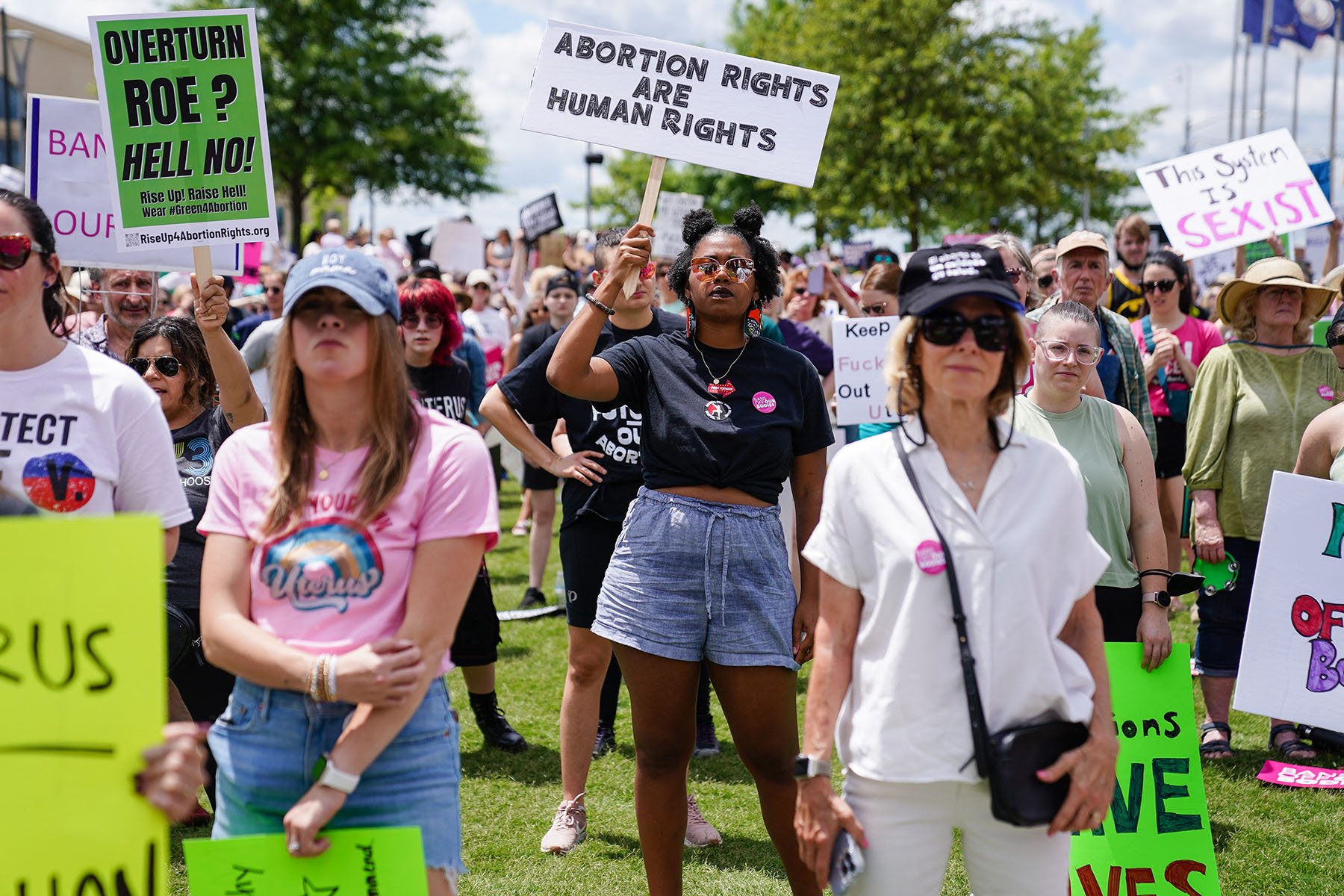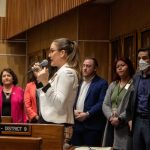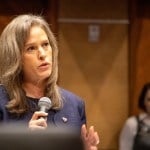Your trusted source for contextualizing abortion and Election 2024 news. Sign up for our daily newsletter.
Callie Beale Harper was 37 when she found out she was pregnant with twins. Already the mom to a four-year-old son, she and her husband were so excited to grow their family, they opted for noninvasive prenatal testing as soon as it was available, at 10 weeks gestational age.
Two weeks later, they learned there was a 96 percent chance one of the twins had a chromosomal abnormality. A visit to a maternal-fetal specialist in Atlanta one week later confirmed their worst fears.
As soon as the ultrasound technician located her son in utero, “I immediately knew that so many things were wrong. His little body was incredibly swollen, completely filled with fluid, and that was honestly really painful to see, because I just hoped that he wasn’t in pain,” Beale Harper told The 19th.
The doctor explained that there were multiple structural abnormalities that would make him “incompatible with life. There was no hope for him, as far as any number of surgeries he could have had to then be OK.” The doctor recommended a procedure known as selective reduction, when one of the fetuses in a multiple pregnancy is terminated to better the chances of a healthy pregnancy and birth for the remaining fetuses. It is a form of abortion.
Beale Harper — who describes herself as a “lover of Jesus” and “great mom” — lives in Georgia, where such a procedure is illegal under the state’s six-week abortion ban. And she knows there are others in the state like her — people who, for a wide variety of reasons, oppose the ban and feel motivated to vote for Vice President Kamala Harris because of it.
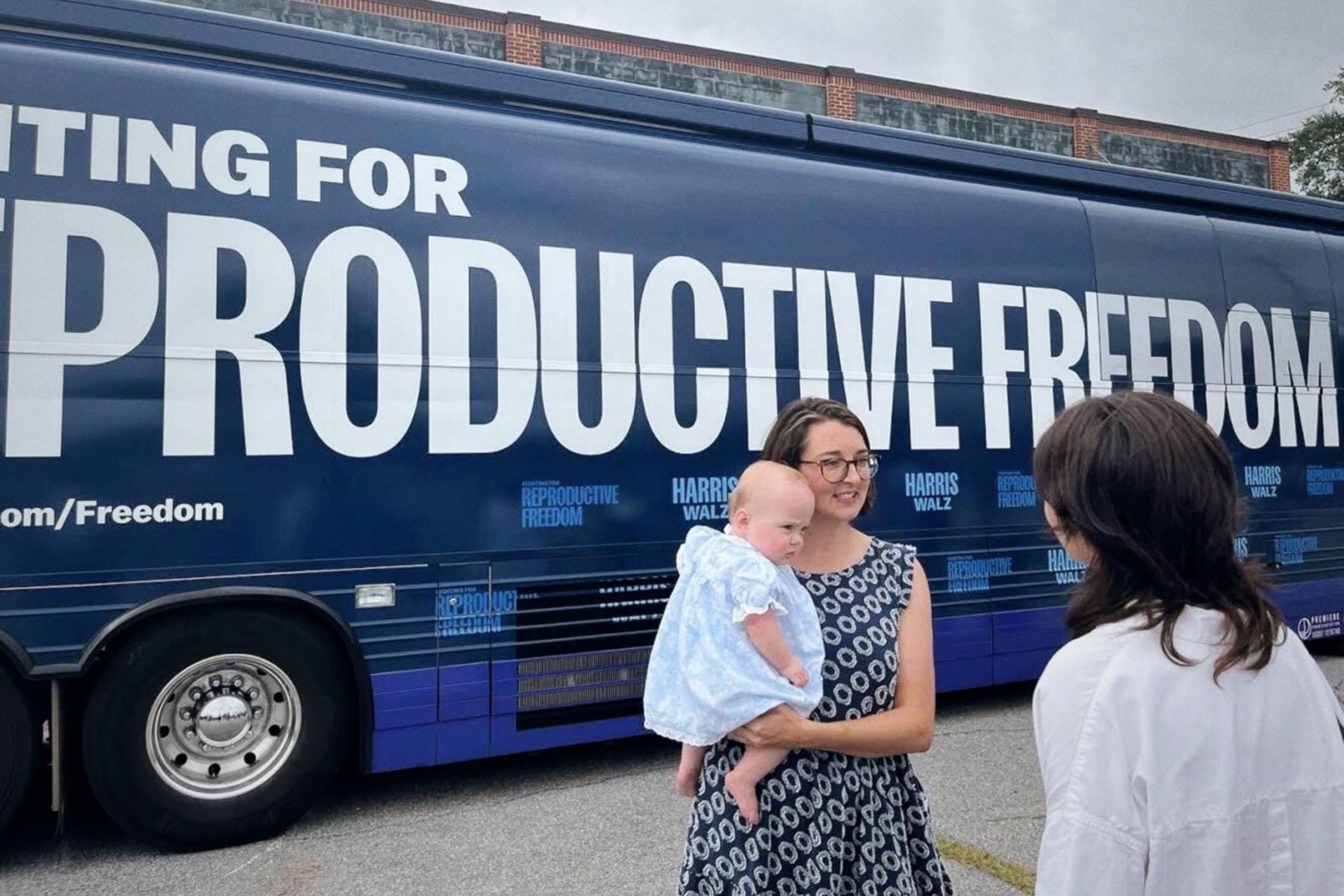
Georgia’s constitution prohibits the kind of ballot initiatives that are popping up nationwide to codify abortion rights; for the existing six-week ban to be reversed, there would either have to be some kind of new federal law guaranteeing abortion access or a new bill passed by the Georgia legislature and signed into law by the governor. But for a broad and diverse coalition of Peach State voters, abortion is still on the ballot — a reality that seems evident to reproductive rights advocates (and opponents) in the state, as well as the Harris campaign, which is putting time and resources into keeping the issue front and center.
“In every space that I’ve walked into since Kamala Harris has been at the top of the ticket, abortion has been part of the discussion,” Democratic Georgia state Rep. Shea Roberts told The 19th. “So even though we can’t do a citizen-led ballot initiative, these events are packed.”
The campaign weighed in Sept. 17 on new reporting from ProPublica on the fatal impact of the ban. “This is exactly what we feared when Roe was struck down,” the vice president said in a released statement. The Harris campaign last month kicked off a 50-stop bus tour, “Fighting for Reproductive Freedom,” in battleground states. The tour made three stops in Georgia, just one week after the vice president herself held a rally in Savannah. Beale Harper met Harris during the Savannah rally and then shared her story with attendees at the bus-stop tour there the following week.
The platform provided by the vice president’s campaign is only one way that regular Georgians like Beale Harper are serving as surrogates to connect with others in their community about their stories — and the upcoming election. Beale Harper is now reaching out to churches and church leaders across the state about why faith and reproductive freedom are not incompatible — and an important vote driver.
In a state that is religiously, racially and culturally diverse, some conversations are louder, some are quieter — but they are happening in public and private spaces alike as Georgians look for ways to vote their beliefs. Nearly 75 percent of Georgians — including 62 percent of Republicans and 83 percent of Democrats — do not want to see abortion criminalized before the point of fetal viability, according to respondents in a University of Maryland poll released on September 4. Nearly the same percentage of all voters — and 86 percent of Black voters — described banning abortion at six weeks as very or somewhat concerning in polling from last year conducted by Reproductive Freedom For All (formerly NARAL), an advocacy group that opposes restrictions to abortion.
Abortion is always on the ballot for Black women, but not as a standalone issue, according to Jara Butler, the chief impact officer for Supermajority, a progressive grassroots organization that focuses on mobilizing young women voters. She has previously worked for Georgians for Choice, a no-longer active group in the state that worked on coalition-building around reproductive freedom, specifically focused on organizing Black women, especially in rural parts of the state and within Black churches.
“When we think about reproductive freedom, we really need to expand that to reproductive justice because for communities of color, especially Black women, it’s about having access to information that will help you carry a pregnancy to term,” Butler said.
Abortion is a critical voting issue for Black women because “it doesn’t matter what your socioeconomic status is — every time that you become pregnant, you risk your life and the life of your child,” she said.
This is all the more true for Black women outside of metro Atlanta, especially those in more rural parts of the state, according to Butler.
“The less access you have to medical care, the more doctors are referring you to a city center for care — which means the less likely you are close to a hospital,” Butler said. “And if you have a high-risk pregnancy, where are you going to go?”
Georgia is one of 10 states that has not fully expanded Medicaid, which limits not only local care and easy hospital access, but ways to pay for prenatal and postnatal care. Black women in rural Georgia, in particular, are concerned about not only what happens in regard to the care they can or cannot receive during pregnancy, but what happens once a new baby is born.
“What we’re hearing from the ground is that they are looking at this in totality — that abortion is an economic issue, that abortion is a public health issue, that abortion is a life or death issue,” Butler said.
What this means is Black women-led conversations within their own communities about the stakes in this election — and how abortion factors into them.
“Black women have always had to advocate for ourselves,” she said. “We are talking to each other and we are having frank conversations, but we’re also talking to the Black community as a whole. We’re talking to Black men and saying, ‘You all need to listen to us because we want better outcomes for ourselves.’”
The galvanizing potential for Georgia voters who oppose the six-week ban (and related restrictions) has not been lost on state lawmakers.
“You will notice that the Republican-majority legislature has really tried to restrict or block any further abortion restriction bills from coming up to the floor in the state legislature,” said Georgia state Rep. Michelle Au. “They have the majority — they could pass basically anything they want, but they know that they’ve pushed it basically as far as it can go in Georgia. They know this is probably a losing issue for them.”
She points to the way that bills restricting access to medication abortion and telemedicine have been stymied and blocked by the Republican-led legislature. “They know that the more we talk about abortion, the more they’re going to lose. They don’t want people to be talking about abortion when they go to the ballot box.”
Roberts, who represents parts of the Sandy Springs and Buckhead communities of Atlanta, previously sponsored a bill to restore abortion access and allow Medicaid coverage. She wasn’t even granted a chance for a hearing on her bill. “This is how much my Republican colleagues do not want to talk about the topic.”
In her district, she finds that women are frequently — and loudly — talking about the loss of reproductive rights they’ve experienced. Even without a ballot initiative, it is a topic that many of her constituents mention and organize around. Roberts, who went public with her own abortion story after Georgia’s six-week ban went into effect in 2022, started a new political action committee, United for Georgia Women, this summer to invest in local candidates to attempt to flip more seats in the state legislature. She said 13 seats would need to flip to break the Republican trifecta.
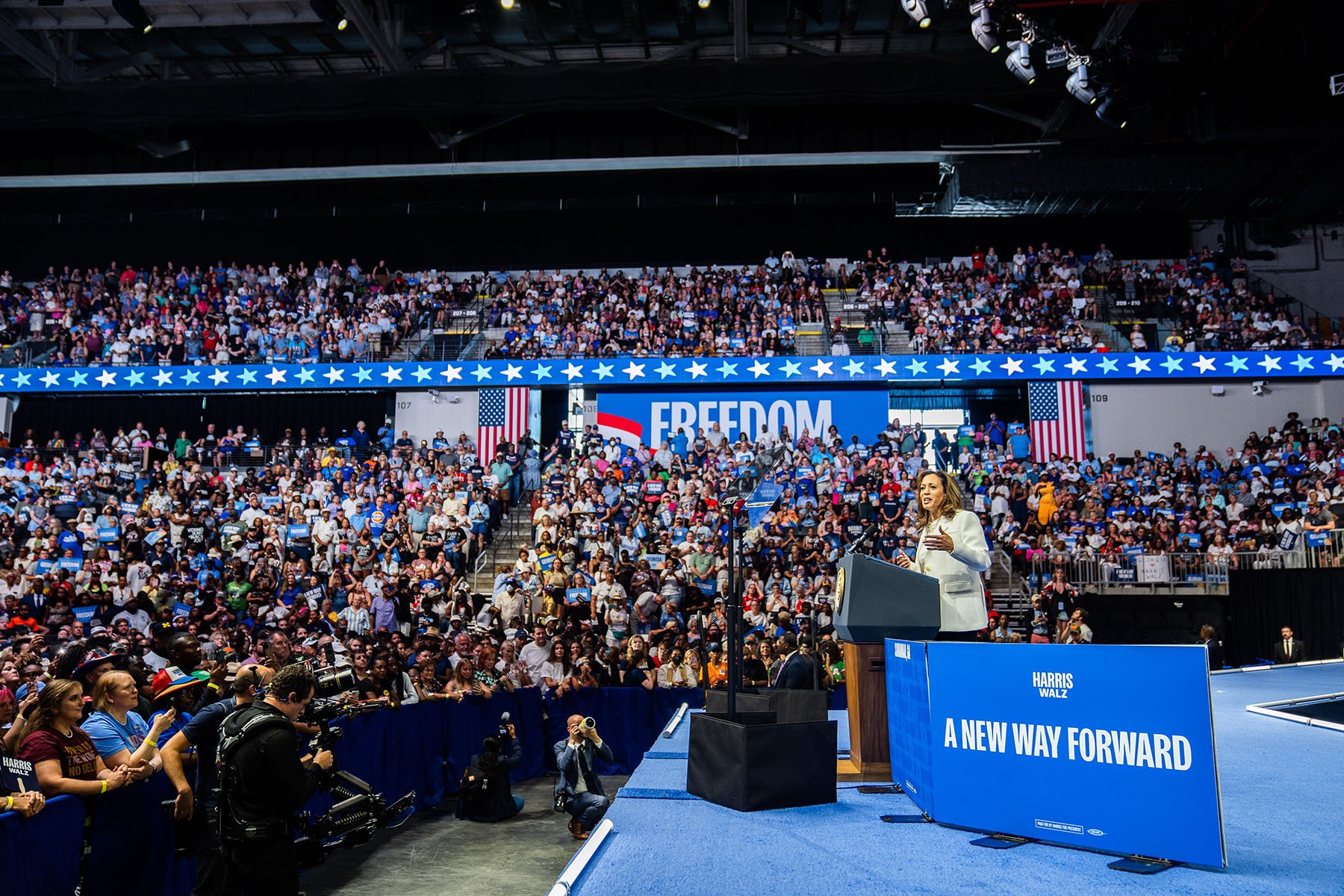
“With Vice President Harris at the top of the ticket, the energy is very high in Georgia, and I am really feeling confident that she is going to win Georgia,” she said, adding that she hopes this will translate to down-ballot races as well.
When door-knocking, Roberts still hears plenty of women telling her that life begins at conception or that they are concerned that if the six-week ban is overturned, pregnant people might choose to have abortions right before delivery.
She has also met many women who seem eager to talk, only to be joined by their husbands who say their wives aren’t interested in speaking further.
Encounters like this are in part why “we’re also trying to spread the message that when you get in the voting booth, it’s you and you alone, and they’re not going to know how you vote,” Roberts said.
Without an option for a ballot initiative, abortion-as-a-voting-issue is sometimes discussed privately rather than in large public forums, and one place these conversations are taking place is in hospitals.
As an anesthesiologist at an Atlanta hospital, Au said she’s heard from numerous medical providers who are concerned about the environment that has been created for medical practice and patient care in the state as a result of the six-week ban.
Many “traditional Republican” colleagues at the hospital “have essentially been turned into Democrats not just because of the extremism they see with [former President Donald] Trump, but specifically related to reproductive health care access and the restrictions [the six-week ban] places on patient care,” she told The 19th.
In Georgia, this also means the threat of criminalization of doctors.
“I think that is really, really scary to people,” Au said.
She said she is also hearing quiet concerns about the impacts of the state’s abortion ban among her own constituents. Au represents Johns Creek, a northeastern suburb with a high percentage of AAPI voters.
Au said that she has heard from AAPI voters in her community, many of them first- and second-generation immigrants, that for them, abortion is a “purely medical issue,” as opposed to a religious or cultural one. For these voters, “it’s perplexing to come to a country which espouses all these freedoms then to have this one very personal medical decision be dictated by the state.”
Though cultural issues might keep these conversations out of the foreground, Au said that, privately, it is something voters routinely bring up with her.
These private conversations about abortion reflect the kind of long-standing cultural stigmas that can still exist in some parts of the state, according to Beale Harper. “In the South, there’s a lot of judgment. People can’t even tell their families about it,” she said.
At the end of August, she shared her abortion experience on social media. Five days later, she was face to face with Harris in Savannah. She said she hopes that publicly sharing her story in person and on political stages can help change the narrative and connect the dots for others.
Her own abortion story didn’t end at her maternal-fetal specialist’s office. Because of Georgia’s abortion law, Beale Harper’s doctor couldn’t offer her referrals or help her research options. He said the state wouldn’t allow him to do so.
Beale Harper ultimately made appointments in three different states, taking the advice of her physician’s office not to cancel any of them until she had a successful procedure. She ultimately ended up going to a doctor in New York City whose first available appointment was four weeks out.
Last October, Beale Harper was overjoyed when she gave birth to a healthy baby girl at 27 weeks. But she also felt “outraged” thinking about the experience she had in accessing the health care she needed — and the pressure she felt to be ashamed of her choice. It was a choice she didn’t feel conflicted about making, even as she mourned the loss of a child she wanted.
Countless women have reached out to Beale Harper since she shared her story. All more or less telling her the same thing: They are Christian women who for whatever reason needed — and received — abortions, and felt like they couldn’t tell anyone. And they oppose Georgia’s six-week ban.
To check your voter registration status or to get more information about registering to vote, text 19thnews to 26797.
